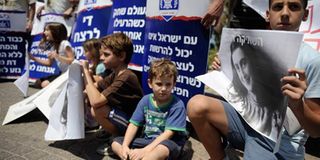Night patrols and ‘light’ side of Mogadishu

People walk past security personnel in Somalia’s capital, Mogadishu, while below, like many other teenagers across the world, young Somalis play street football in the cool of the evening. Watching or playing football was banned while much of the city was under the control of the armed group Al-Shaabab. Al Jazeera photos
Mogadishu- In 2011, African Union Mission in Somalia (Amisom) forces largely pushed out the armed group al-Shaabab from Somalia’s capital city of Mogadishu.
Since then, police units from Nigeria and Uganda have been attempting to train and equip the fledgling Somali Police Force (SPF) in securing the capital city.
Part of this effort has been conducting nightly joint patrols with the SPF. These patrols, and the recent introduction of solar powered lights onto the city’s main streets, have helped allow businesses to reopen, enabling civilians to move more freely after dark.
Threat on
However, the threat of al-Shaabab is still apparent in Mogadishu, with regular bomb and IED attacks an indicator of the challenges that Amisom and the fledgling government face in securing the capital.
On this particular evening, a local police station was attacked with small arms fire just 30 minutes after the night patrol had passed by. The perpetrators fled before police could mount a significant response.
At one point during the patrol, vehicles passed freely through checkpoints as local police sat around chatting and sleeping, some chewing the stimulant, khat, while on duty. “It’s cold at night and we have to stay awake,” said one Somali police officer. “I chew khat to stay warm while we’re working.”
When questioned about the competency of their SPF counterparts, Nigerian Assistant Superintendent of Police Ahmed Usman replied, “They are the ones responsible for security, searching cars and civilians. All we can do is provide them cover.”
The solar lights that now line the streets have also been the target of two separate bomb attacks by al-Shaabab in July and August, the latter resulting in minor injuries. “They hate the lights as it hampers their activities,” said one Amisom police officer.
The insurgent group see lights as a threat to their operations in the capital which are now largely prepared under the cover of night.
On this evening the Amisom police were optimistic about the impact night patrols were having in Mogadishu.
Illuminated by the solar lights, women fetched water, men chattered outside their shopfronts and boys played football in the dusty streets, activities previously unseen after dark just nine months ago.
This article is reproduced
from Al Jazeera




